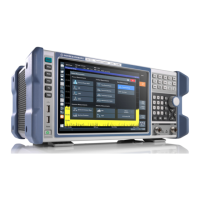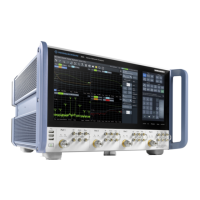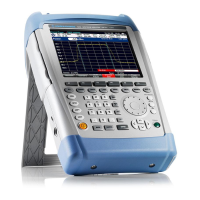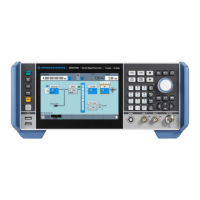Interfaces and Protocols R&S FSL
1300.2519.12 5.28 E-11
Interfaces and Protocols
T
he standard instrument is accessed via LAN in order to perform for remote control. Optional a GPIB
interface can be used for remote control, provided by option GPIB Interface, R&S FSL–B10.
LAN Interface
To be integrated in a LAN, the instrument is equipped with a LAN interface, consisting of a connector, a
network interface card and protocols (VXI–11 and RSIB). For details on the connector and its use refer
to the Quick Start Guide, chapter 1 "Front and Rear Panel".
Instrument access via VXI11 or RSIB is usually achieved from high level programming platforms by
using VISA as an intermediate abstraction layer. VISA encapsulates the low level VXI, RSIB or even
GPIB function calls and thus makes the transport interface transparent for the user. The necessary
VISA library is available as a separate product. For details contact your local R&S sales representative.
VXI Basics
The VXI–11 standard is based on the RPC protocol which in turn relies on TCP/IP as the
network/transport layer. The TCP/IP network protocol and the associated network services are
preconfigured. TCP/IP ensures connection–oriented communication, where the order of the exchanged
messages is adhered to and interrupted links are identified. With this protocol, messages cannot be lost.
Remote control of an instrument via a network is based on standardized protocols which follow the OSI
reference model (see Fig. below).
SCPI
XDR (VXI-11)
ONC-RPC
TCP / UDP
IP
Ethernet/802.3
802.3/10BASE-T
Application
Presentation
Session
Transport
Network
Data Link
Physical
Fig. 5–5 Example for LAN remote control based on the OSI reference model
Based on TCP/UDP, messages between the controller and the instrument are exchanged via open
network computing (ONC) – remote procedure calls (RPC). With XDR (VXI–11), legal RPC messages
are known as VXI–11 standard. Based on this standard, messages are exchanged between the
controller and the instrument. The messages are identical with SCPI commands. They can be organized
in four groups:
• program messages (control command to the instrument)
• response messages (values returned by the instrument)
• service request (spontaneous queries of the instrument)
• low–level control messages (interface messages).

